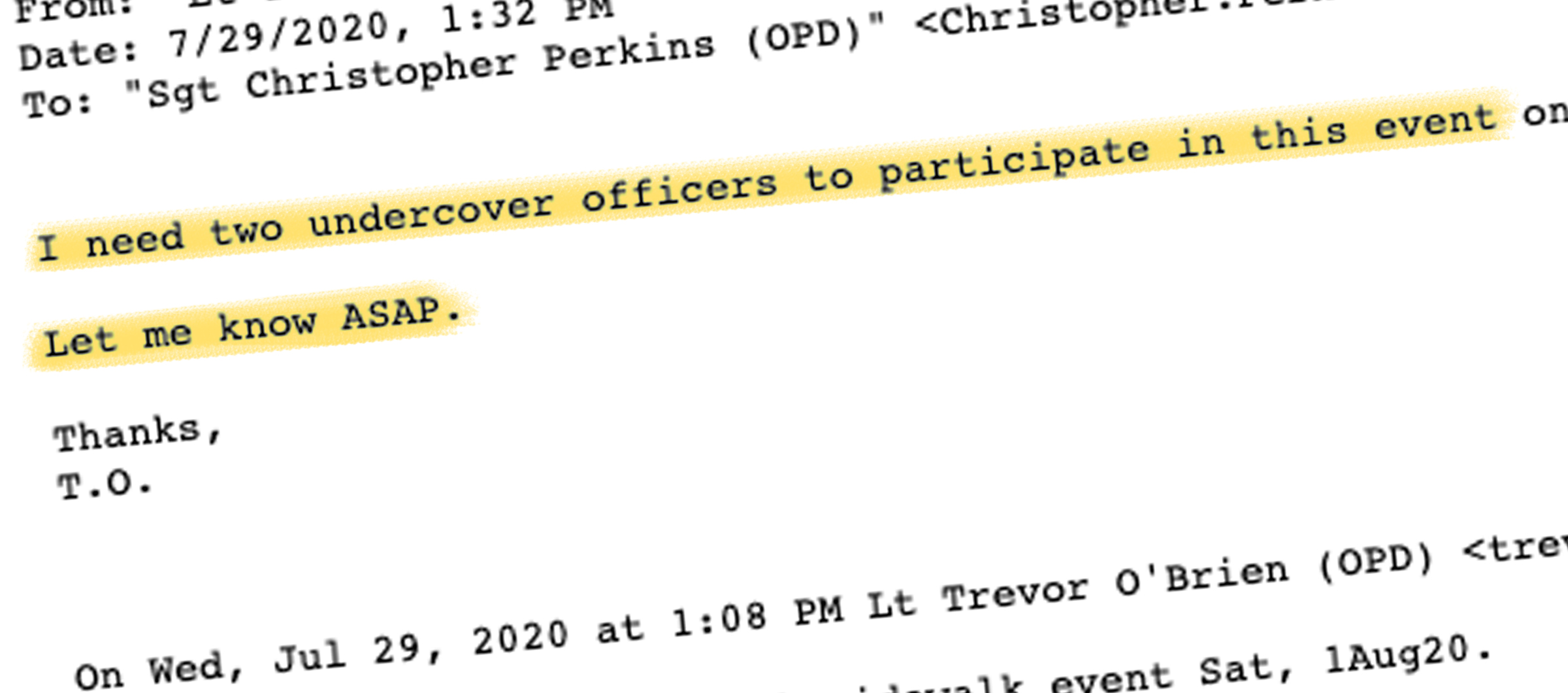A string of public records requests led us to discover Omaha Police were closely monitoring Black activists and allies. In Nebraska, the law protects our right to access most emails and other records written by government employees.
First reported by NOISE, the story jolted Omaha before quickly making more headlines and reaching the entire state.
Emails released by our team showed the Omaha Police Department closely monitoring the activities of Black activists and their allies. Records showed officers sharing the location of a private birthday party, requesting undercover officers participate in a chalking event even after they were told it was lawful activity, and weighing in on Black leaders’ perspectives about police reform.
The story prompted a flurry of texts, calls and emails from local organizers and advocates. Most conversations included something like this: “Did my name come up? How did you find this? Thank you for calling attention to this.”
HOW WE GOT THE EMAILS
The effort began with an unrelated public records request. We contacted Omaha Police to request a list of the munitions that they used at protests sparked by the killing of George Floyd in their militarized police response. One record in particular caught our eye. Police were emailing with city officials about the lawful activity of a local advocate, someone organizing bail support for arrested protesters.
We reached out to the advocate and she suggested a few more names to include a future search. Fast forward past phone calls, emails and two more records requests, and you end up with more than 1,700 emails and attachments in response to our narrow search terms.
LEVERAGING RECORDS REQUESTS
Nebraska state law clearly defines your right to access public records in the custody of Nebraska public agencies. If an email, text message or document was written on taxpayers’ time with taxpayer resources – barring narrow exemptions – it can be accessed by we the people.
The City of Omaha has a public records portal and you can find a helpful breakdown of how to use it on the Omaha Police Department website. For most records, the City of Omaha says the department responding to your request can provide the documents you’re requesting via email at no charge.
Your experience might differ if you’re looking for records in another community or from another public agency. Every agency handles requests differently, but they all are bound by the same law. In other words, while your requesting process might differ, the basics of a response shouldn’t.
Here’s what Nebraska law requires:
- Government agencies must reply to a request within four business days although they can take longer to actually provide records. The law requires requests be fulfilled “as soon as is practicable and without delay.”
- These agencies can charge a fee to provide records but by law that fee can’t exceed the actual cost of making the copy available.
- There are exemptions to what records can be provided but they must be specifically identified, and the requester can appeal. For example, with the Lincoln Journal Star and the Omaha World-Herald, we took the Nebraska Department of Correctional Services all the way to the Nebraska Supreme Court and won after the department refused to provide lethal injection drug records.
The National Freedom of Information Coalition offers a text template for requesting public records from agencies that don’t have portals like the City of Omaha. The Student Press Law Center also offers a form-fillable template.
A word of advice: requests that are narrow and specific have a much better chance of avoiding roadblocks like excessive fees or unreasonable delays. For example, if you were looking for an email, identify the email account you’re interested in, a specific search term you’re looking for and set boundaries of a few weeks or months at most.
At the same time, be careful not to limit results by providing space for attorneys to duck your request. Don’t say you’re looking for emails that show a certain activity because the responding agency might disagree on your assessment. Look no further than the City of Omaha making the absurd claim that police weren’t engaged in surveillance because “phones were not wiretapped.” If we had requested emails showing police surveillance, we wouldn’t have received a thing.
TRANSPARENCY HELPS OUR DEMOCRACY WORK. PERIOD.
The ACLU protects Nebraskans' right to obtain public records because a democracy cannot function without government transparency. Our work has kept Nebraska’s public records law strong and ensured state and local government agencies comply with the law. And even when records show agencies are within the letter of the law, public scrutiny makes it more likely they’ll also act ethically. After all, just because you can do something, doesn’t mean you should.
Our police email release continues our work promoting open government that is accountable to the people.



